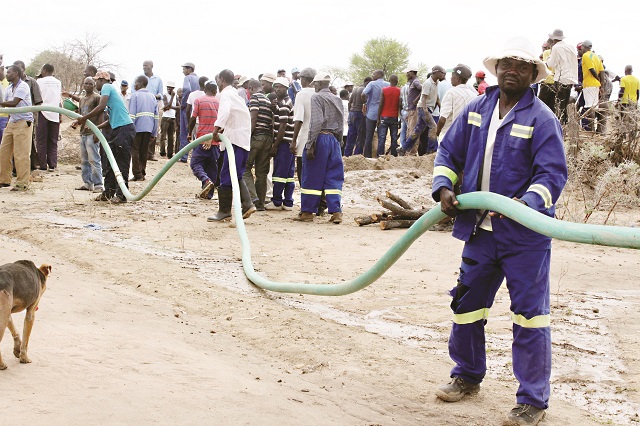Mining sector should be made safer


Villagers drain water from a mine shaft in search of trapped miners in Inyathi in this file photo. Fatal accident after fatal accident has been occurring in the informal mining sector, resulting in the loss of lives of a large number of people in the past few years in various parts of Zimbabwe
Saul Gwakuba Ndlovu
Fatal accident after fatal accident has been occurring in the informal mining sector, resulting in the loss of lives of a large number of people in the past 10 years in various parts of Zimbabwe.
Hardly a month passes without one or more of the country’s print media publishing a story about a tragedy having occurred at one or other of Zimbabwe’s numerous officially abandoned mines.
Similar tragedies occur also in neighbouring South Africa where literally scores of Zimbabweans perish in disused mines, particularly on the Reef almost every month.
Zimbabwean law enforcement authorities do not seem to be doing much, if anything at all, about this highly disturbing development, not in South Africa, of course, but within their own administrative territory.
Zimbabwe is awash with a wide variety of minerals as well as abandoned mining sites and dumps.
Meanwhile, the country’s unemployment rate is alarmingly high. Admittedly the national economy has taken a nose-dive.
Zimbabwe’s national economy comprises mainly the agricultural and the mining sectors. The agricultural sector is always affected, usually negatively, by weather conditions.
Droughts have also had adverse effects on the national economy. That has left the mining sector as Zimbabwe’s national economic mainstay.
And the main mineral sought is gold because it pays well and is probably the easiest to sell. It is because of those factors that a very large number of young adult men have taken to gold-panning in rivers and wherever else they think that mineral can be found. The country has a ministry whose responsibility is the mining sector.
Its mandate is to legislate for that particular sector: for the identification of mines, their minerals, their location and accessibility, their ownership, mode of operation including safety and security measures, the way they market their products, and they dispose their waste which may be solid, gaseous and or liquid.
It is one of that ministry’s responsibilities to monitor disused mines. Working with the Zimbabwe Republic Police (ZRP) and the ministry responsible for Zimbabwe’s environment, they monitor disused or abandoned mines to ensure that unauthorised access is not made by irresponsible members of the public.
That is done in case there are dangerous chemicals and grounds in the mines’ vicinity or inside it proper. The public has to be protected virtually against itself.
In addition to all this, there should also be laws to protect Zimbabwe’s physical environment from wanton destruction by unmonitored and unregistered miners.
A tour of Kwekwe town and its environs shows why this has to be done. That locality is now scarred, ruined and devastated by gold panners. It is not at all understandable why the Kwekwe municipal authorities let that massive destruction of their land to occur, and right under their noses. Could it be that they were, themselves, responsible for that ecological mess?
Similar destruction of the environment has taken place in several other places some of which are under rural district councils.
The general impression created by all this is that the mining sector in Zimbabwe is relatively out of control, and thus anyone can enter into any disused mine and carry out mining activities without any safety measures whatsoever.
The immediate explanation about that situation is that all that is caused by the country’s high unemployment level.
While we should emphasise that is only an explanation and not an excuse, we hasten to add that the relevant ministry should have appropriate personnel in every district to monitor every mining activity, its lawfulness, its safety to the relevant community, its adherence to security measures in connection with the use and storage of its chemicals and equipment, its operations and its food, beverages, health practices, its means of communication as well as its marketing activities.
The social security of those involved, including their accommodation and medical services requirements need to be closely monitored as well lest disease epidemics break out and affect the whole country. The Ministry of Mines and Mining Development should be working most closely with that of Environment and, of course, that of Home Affairs. All these ministries should adopt a pro-active as opposed to a reactive approach.
The best way to deal with unemployment is to make each village economically productive by the use of local resources. Local human resources can be trained to generate local transport and communication services, and to make usable and useful local products some which may be exported to nearby localities.
Well organised mining activities, closely supervised by the relevant ministries, can be launched not only for gold, but even for gravel. Village heads, headmen and chiefs can be guided to spearhead such mining operations in their respective areas.
That can drastically reduce the high incidence of mining accidents in the country and at the same time significantly benefit the communities in accordance with the Government’s community shareholding policy.
We should bear in mind the fact that a human being’s life is generally, if not always, more valuable than the minerals an average person can extract from the ground at any given time.
A 25-year-old man may, for example, be crushed to death by a boulder from which that man could have got gold worth $500. If he had lived for at least another 25 years, he could have undoubtedly raised more than $500.
In addition to which, he would have given numerous invaluable services to his family, to say nothing about the priceless love he would have given or shown to his family, friends and community.
The pleasure one normal human being derives from merely seeing another living human being is immeasurable although it is generally unconsciously felt and unpronounced. The loss of human lives whether it occurs in a foreign land, thousands of kilometres away, brings sadness to every normal surviving person, more so if it is in one’s home, one’s community or one’s country.










Comments